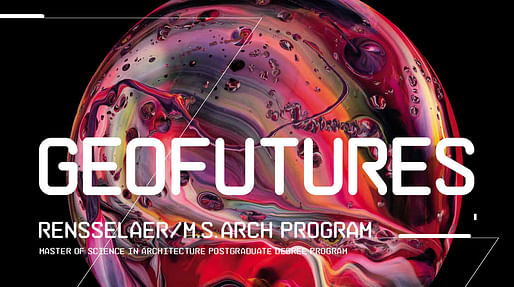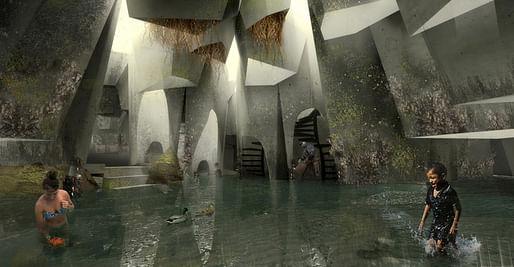


A Rensselaer student project from the Geofutures Master of Science in Architecture program at Rensselaer Architecture was selected as the second-place winner in the speculative category of the Dry Futures competition, sponsored by Archinect in 2015. The competition was designed to address the unfolding drought crisis in California. Archinect launched the competition in the summer of 2015, the fourth year of California’s ongoing drought, asking for bold design proposals that could mitigate the over-consumption of water.
The competition was divided into two categories: one for speculative projects and the other for pragmatic responses. The Geofutures “Urban Swales” project received second place in the speculative category. The project was conceived by Muhammad Ahmad Khan, a graduate student in the Geofutures Master of Science in Architecture program at Rensselaer Architecture as part of an advanced design studio conducted by Chris Perry, Assistant Professor, Head of Graduate Studies, and Program Director of Geofutures, and Ted Ngai, a Lecturer at Rensselaer Architecture and a studio instructor in the Geofutures program. Additional support was provided by Rensselaer Architecture faculty Fleet Hower, Kelly Winn, and Lydia Xynogala.

↑ Sectional model of downtown LA ‘urban swale’ showing subterranean reservoir and terraced water filtration landscape as situated below an excavated road intersection, Urban Swales (Geofutures, 2015)
According to Khan, “Urban Swales” proposes a series of medium-scale urban excavations throughout the city of Los Angeles, micro-reservoirs that, in addition to collecting periodic storm water runoff for remediation, storage, and redistribution to local communities, provides a new typology of shaded “urban caverns” for human occupation. Additionally, the terraces encourage biodiversity among insects, birds, and small animals, activating the swale as a refuge for wildlife. “As such, Urban Swales not only functions as a distributed form of water management infrastructure, the general ambition of which is intended to relieve the city’s excessive dependence on imported water, but a new form of public space and wildlife refuge as well,” Khan stated.
“The Geofutures advanced design studio for the academic year 2014-15 established coastal flooding and drought as principal architectural problems for consideration by each of the graduate architecture students,” said Perry. “The fall semester began with an introduction to contemporary environmental discourse as it concerns the Anthropocene, an age marked by the existential threat of shifting human-nonhuman relations. As such, the students were challenged to engage the general topic of global warming in practical as well as philosophical terms. If architecture can be understood as a discipline that is both practical and discursive in nature, with buildings considered to be mechanical as well as cultural artifacts, the students were challenged not only to develop new forms of utility in a time of environmental crisis, but new forms of visual and spatial aesthetics as well.

↑ Aerial rendering of a typical ‘urban swale’, this one located at a road intersection in downtown Los Angeles, Urban Swales (Geofutures, 2015)
“The ‘Urban Swales’ project is an exemplar of precisely this twofold ambition,” Perry continued. “The project not only addresses the very real problem of drought in ways that are tangible, but leverages the problem itself as a new opportunity to reimagine architecture and urbanism in a time of global warming. In effect, what was assumed to be only negative is converted into something positive.” “Urban Swales” is designed to subvert the conventional quest for water as an act of drilling wells into the landscape. Rather than excavating and tapping into existing water reserves or aquifers, it instead activates the potential of dormant urban hydrologies.
According to Perry, the Geofutures graduate program, which offers a Master of Science in Architecture degree, “endeavors to convert crisis into opportunity by harnessing both the pressures of a planet at risk and the promise of emerging environmental technologies to generate a broad spectrum of possible, if not probable, urban and architectural futures for the 21st century. Premised on the belief that the challenges of the contemporary city are far too complex for any one discipline to manage on its own, Geofutures brings together architects, landscape architects, scientists, and technologists to address a wide range of interdisciplinary issues.”

↑ Aerial rendering of reconstituted ‘shoreline’ around lower Manhattan, The Mannahatta Project (Geofutures, 2015).

↑ Interior rendering of ‘beach zone’ portion of reconstituted ‘shoreline’ showing human-nonhuman spatial and programmatic interface, The Mannahatta Project (2015).
In the fall of 2015, Perry presented student research and design work from the Geofutures program at the AICAD conference at the California College of the Arts in San Francisco and in the spring semester of 2015, he presented work from the Geofutures program as part of the keynote plenary for the 103rd Annual Meeting of the ACSA in Toronto.
The Geofutures program is an example of how Rensselaer embodies “The New Polytechnic”, an innovative paradigm for teaching, learning, and research. Recognizing that global challenges and opportunities are so great that they cannot be addressed by the most talented person working alone, nor even by a single discipline, sector, or nation, The New Polytechnic enables collaborations between talented people across disciplines, sectors, and global regions, in order to address the complex problems facing the world. This vision amplifies the ways in which the global impact of Rensselaer research, innovative pedagogy, and transformative student experience are changing the world.
Geofutures Program Description
Fifteen years ago, Nobel Prize-winning atmospheric chemist Paul Crutzen announced that the world had entered a new geological age, what he termed the Anthropocene, a period characterized by the long-term effects of industrialization on planet Earth. As such, this period marks a fundamental shift in human-nonhuman relations; whether manifest in the form of coastal flooding or mega-droughts, we have entered a new period of environmental uncertainty in which the conventional boundaries between nature and culture have been rendered ambiguous.
Geofutures seeks to engage such uncertainty by posing the following two questions: Should architecture, along with the disciplines of landscape architecture and urban design, embark on establishing new affiliations beyond the human? And in doing so, might we convert crisis into opportunity by harnessing the pressures of a planet at risk to generate a broad spectrum of possible, if not probable, urban and architectural futures for the twenty-first century?

↑ Rendering of artificial island proposal for endangered species incubation, Coropolis (Geofutures, 2013).
MSArch Degree Description
The Geofutures Master of Science in Architecture (MSArch) is a one-year postgraduate program intended for students who already hold a professional undergraduate degree in architecture (BArch or equivalent) but would like to obtain a masters degree. The program is also open to students interested in advanced graduate study who hold an undergraduate non-professional degree from a related field of study in the arts, sciences, or humanities.
Geofutures Curriculum Description
Geofutures provides a highly integrated and diversified curriculum of coursework over the span of two consecutive semesters. This curriculum includes design studios, history, theory, and criticism seminars and lecture courses, introductory and advanced courses in building science, as well as computation and fabrication seminars and workshops.
Digital Workshop
Rensselaer Architecture offers a Digital Workshop for all incoming students that provides a comprehensive introduction to a wide range of software, including Rhino, Grasshopper, V-Ray, Pepakura Designer, and Adobe programs such as Illustrator, Photoshop, and InDesign.
Geofutures Program Website
For more information about the program, please visit the Geofutures website: geofutures.arch.rpi.edu
Deadline to apply is January 1, 2017. Merit-based scholarships are available to qualified applicants with priority given to applications received by January 1. Rolling Application Deadline is March 15, 2017.
No Comments
Block this user
Are you sure you want to block this user and hide all related comments throughout the site?
Archinect
This is your first comment on Archinect. Your comment will be visible once approved.